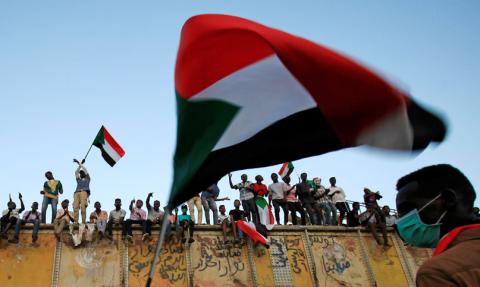Advertisement
Sudanese forces clear protesters with gunfire ahead of fresh talks
KHARTOUM (Reuters) - At least nine people were wounded on Wednesday when Sudanese security forces used live ammunition to clear demonstrators from central Khartoum, a protest group said, ahead of a meeting on who will run the country as it transitions to democracy.
The Sudanese Professionals' Association (SPA), which spearheaded months of protests that led to the military's removal of President Omar al-Bashir last month, gave the figure of nine wounded, in a statement.
Amjad Farid, a spokesman for the SPA, said, "We hold the military council responsible for attacking civilians".
"They are using the same methods as the previous regime in dealing with rebels," he told Reuters, referring to Bashir's government.
There was no immediate comment from the military on Wednesday's violence.
Early on Wednesday the military announced a committee would investigate the targeting of protesters after at least four people were killed in violence in Khartoum on Monday.
Weeks of street protests that precipitated the end of Bashir's 30-year rule on April 11 have continued as the opposition demands that the military hand over power to civilians.
A Reuters witness and Sudanese witnesses said that troops in military vehicles using the logo of the paramilitary Rapid Support Forces (RSF) fired extensively as they tried to clear demonstrators on al-Mek Nimir Avenue in central Khartoum, near the Foreign Ministry.
"People were walking towards the barricades and they (security forces) were firing shots at them," a 20-year-old demonstrator, who asked not to be named, said, showing a handful of empty bullet casings and referring to road blocks set up by protesters.
The violence took place hours before the Transitional Military Council (TMC), which took over after overthrowing and jailing Bashir, was due to meet representatives of the umbrella opposition group Declaration of Freedom and Change Forces (DFCF) to try to hammer out a final deal for the transitional period.
The two sides, which have held talks for several weeks, announced early on Wednesday they had agreed on the composition of a legislative council and the duration of the transition. They said they would continue talks on the key sticking point - the make-up of a sovereign ruling council.
Both sides expressed optimism that they could reach a final deal, with talks expected to resume on Wednesday evening.
CAUTION
Some demonstrators expressed caution over the prospects for an agreement that would satisfy their demands for a handover of power to civilians, and for security forces to be held to account for the deaths of demonstrators.
"We are still sticking to our plan," said Altaj Blah, a protester in central Khartoum. "The barriers are there and they are not moving until our demands are met," he said.
In the agreement announced early on Wednesday the two sides said the transition would last three years - a compromise between the military council's proposal of two years and the opposition DFCF's preference for four.
The TMC said the DFCF would have two-thirds of the seats on a transitional legislative council while parties outside the alliance would take the rest. Elections would be held at the end of the three-year transition.
On Monday after security forces tried to clear some protest sites, at least four people, including three protesters and a military police officer, were killed in an outburst of violence. They were the first deaths linked to the protests for several weeks.
DFCF members blamed security and paramilitary forces, while also voicing suspicions that groups linked to Bashir might be fomenting unrest to undermine the chances of a political accord.
(Additional reporting by Khaled Abdelaziz and Eltayeb Siddig; Writing by Aidan Lewis and Sami Aboudi; Editing by Mark Heinrich, Yousef Saba and Frances Kerry)



















Add new comment